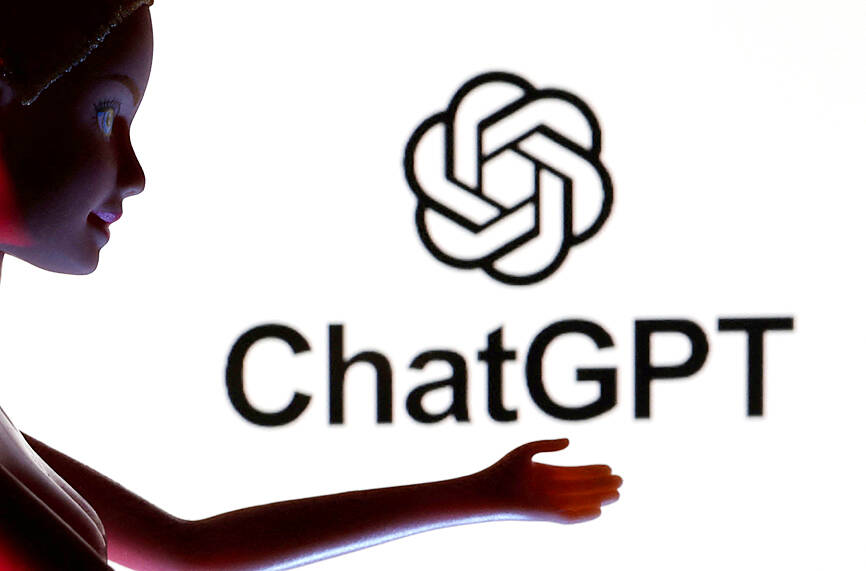US regulators on Tuesday took a first step toward drawing up new rules on artificial intelligence (AI) that could lead to the White House putting the brakes on new technologies such as ChatGPT.
The US Department of Commerce put out a call for input from industry actors that would serve to inform the administration of US President Joe Biden in drafting regulation on AI.
Biden last week said the jury is still out on whether AI poses a danger to society, but the move on Tuesday signaled that the White House is open to setting some ground rules.

Photo: REUTERS
“Just as food and cars are not released into the market without proper assurance of safety, so too AI systems should provide assurance to the public, government, and businesses that they are fit for purpose,” the commerce department said in a statement.
The US is home to the biggest innovators of tech and AI, including Microsoft Corp-backed OpenAI, which created ChatGPT, but trails internationally in regulating the industry.
Biden has urged the US Congress to pass laws putting strict limits on big tech, but these have little chance of making headway given political divisions among lawmakers.
The lack of rules has given Silicon Valley freedom to put out new products and stoked fears that AI technologies would wreak havoc on society before the government can catch up.
Last month, Twitter Inc CEO Elon Musk and a range of other CEOs and experts called for a pause in the development of powerful AI.
OpenAI has asked that its AI systems be subject to “rigorous safety evaluations” and said comprehensive regulation of the sector was needed.
“Our inquiry will inform policies to support AI audits, risk and safety assessments, certifications, and other tools that can create earned trust in AI systems,” US Assistant Secretary of Commerce for Communications and Information Alan Davidson said.
The Spanish Data Protection Agency (AEPD) on Tuesday said that it has asked an EU watchdog to evaluate privacy concerns surrounding ChatGPT.
News of the request by the agency came as the French National Commission on Informatics and Liberty said it was investigating several complaints about ChatGPT and Italy’s data regulator was reviewing measures proposed by OpenAI in response to concerns that led the regulator to ban the chatbot temporarily.
The Italian regulator’s board was meeting on Tuesday.
“The AEPD understands that global processing operations that may have a significant impact on the rights of individuals require coordinated decisions at European level,” a spokesperson for the Spanish agency said in an e-mailed statement.
“Therefore, in the short term, it has requested that the issue of ChatGPT be included in the next Plenary of the European Data Protection Committee, so that harmonized actions can be implemented within the framework of the application of the General Data Protection Regulation,” the spokesperson said.
A plenary meeting of the committee, which includes representatives of national data privacy watchdogs, is scheduled for today.
Additional reporting by Reuters

Intel Corp chief executive officer Lip-Bu Tan (陳立武) is expected to meet with Taiwanese suppliers next month in conjunction with the opening of the Computex Taipei trade show, supply chain sources said on Monday. The visit, the first for Tan to Taiwan since assuming his new post last month, would be aimed at enhancing Intel’s ties with suppliers in Taiwan as he attempts to help turn around the struggling US chipmaker, the sources said. Tan is to hold a banquet to celebrate Intel’s 40-year presence in Taiwan before Computex opens on May 20 and invite dozens of Taiwanese suppliers to exchange views

Application-specific integrated circuit designer Faraday Technology Corp (智原) yesterday said that although revenue this quarter would decline 30 percent from last quarter, it retained its full-year forecast of revenue growth of 100 percent. The company attributed the quarterly drop to a slowdown in customers’ production of chips using Faraday’s advanced packaging technology. The company is still confident about its revenue growth this year, given its strong “design-win” — or the projects it won to help customers design their chips, Faraday president Steve Wang (王國雍) told an online earnings conference. “The design-win this year is better than we expected. We believe we will win

Chizuko Kimura has become the first female sushi chef in the world to win a Michelin star, fulfilling a promise she made to her dying husband to continue his legacy. The 54-year-old Japanese chef regained the Michelin star her late husband, Shunei Kimura, won three years ago for their Sushi Shunei restaurant in Paris. For Shunei Kimura, the star was a dream come true. However, the joy was short-lived. He died from cancer just three months later in June 2022. He was 65. The following year, the restaurant in the heart of Montmartre lost its star rating. Chizuko Kimura insisted that the new star is still down

While China’s leaders use their economic and political might to fight US President Donald Trump’s trade war “to the end,” its army of social media soldiers are embarking on a more humorous campaign online. Trump’s tariff blitz has seen Washington and Beijing impose eye-watering duties on imports from the other, fanning a standoff between the economic superpowers that has sparked global recession fears and sent markets into a tailspin. Trump says his policy is a response to years of being “ripped off” by other countries and aims to bring manufacturing to the US, forcing companies to employ US workers. However, China’s online warriors